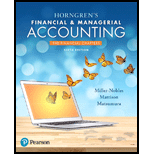
Concept explainers
(1)
Accounts receivable refers to the amounts to be received within a short period from customers upon the sale of goods and services on account. In other words, accounts receivable are amounts customers owe to the business. Accounts receivable is an asset of a business.
Bad debt expense:
Bad debt expense is an expense account. The amounts of loss incurred from extending credit to the customers are recorded as bad debt expense. In other words, the estimated uncollectible accounts receivable are known as bad debt expense.
Allowance method:
It is a method for accounting bad debt expense, where uncollectible accounts receivables are estimated and recorded at the end of particular period. Under this method,
Direct write-off method:
Under this method, accounts would be written off only when it is determined that the receivables from a customer remain uncollectible.
Write-off:
Write-off refers to deduction of a certain amount from accounts receivable, when it becomes uncollectible.
To journalize: The September month transactions using allowance method.
(2)
To journalize: The September month transactions using direct-write off method.
(3)
To Show: The amount of bad debts expense that will be reported on the income statement under each of the two methods, and describe which amount best matches expenses with revenue.
(4)
To identify: The amount that would be reported as net accounts receivable on the
Want to see the full answer?
Check out a sample textbook solution
Chapter 8 Solutions
Horngren's Financial & Managerial Accounting, The Financial Chapters (6th Edition)

 AccountingAccountingISBN:9781337272094Author:WARREN, Carl S., Reeve, James M., Duchac, Jonathan E.Publisher:Cengage Learning,
AccountingAccountingISBN:9781337272094Author:WARREN, Carl S., Reeve, James M., Duchac, Jonathan E.Publisher:Cengage Learning, Accounting Information SystemsAccountingISBN:9781337619202Author:Hall, James A.Publisher:Cengage Learning,
Accounting Information SystemsAccountingISBN:9781337619202Author:Hall, James A.Publisher:Cengage Learning, Horngren's Cost Accounting: A Managerial Emphasis...AccountingISBN:9780134475585Author:Srikant M. Datar, Madhav V. RajanPublisher:PEARSON
Horngren's Cost Accounting: A Managerial Emphasis...AccountingISBN:9780134475585Author:Srikant M. Datar, Madhav V. RajanPublisher:PEARSON Intermediate AccountingAccountingISBN:9781259722660Author:J. David Spiceland, Mark W. Nelson, Wayne M ThomasPublisher:McGraw-Hill Education
Intermediate AccountingAccountingISBN:9781259722660Author:J. David Spiceland, Mark W. Nelson, Wayne M ThomasPublisher:McGraw-Hill Education Financial and Managerial AccountingAccountingISBN:9781259726705Author:John J Wild, Ken W. Shaw, Barbara Chiappetta Fundamental Accounting PrinciplesPublisher:McGraw-Hill Education
Financial and Managerial AccountingAccountingISBN:9781259726705Author:John J Wild, Ken W. Shaw, Barbara Chiappetta Fundamental Accounting PrinciplesPublisher:McGraw-Hill Education





